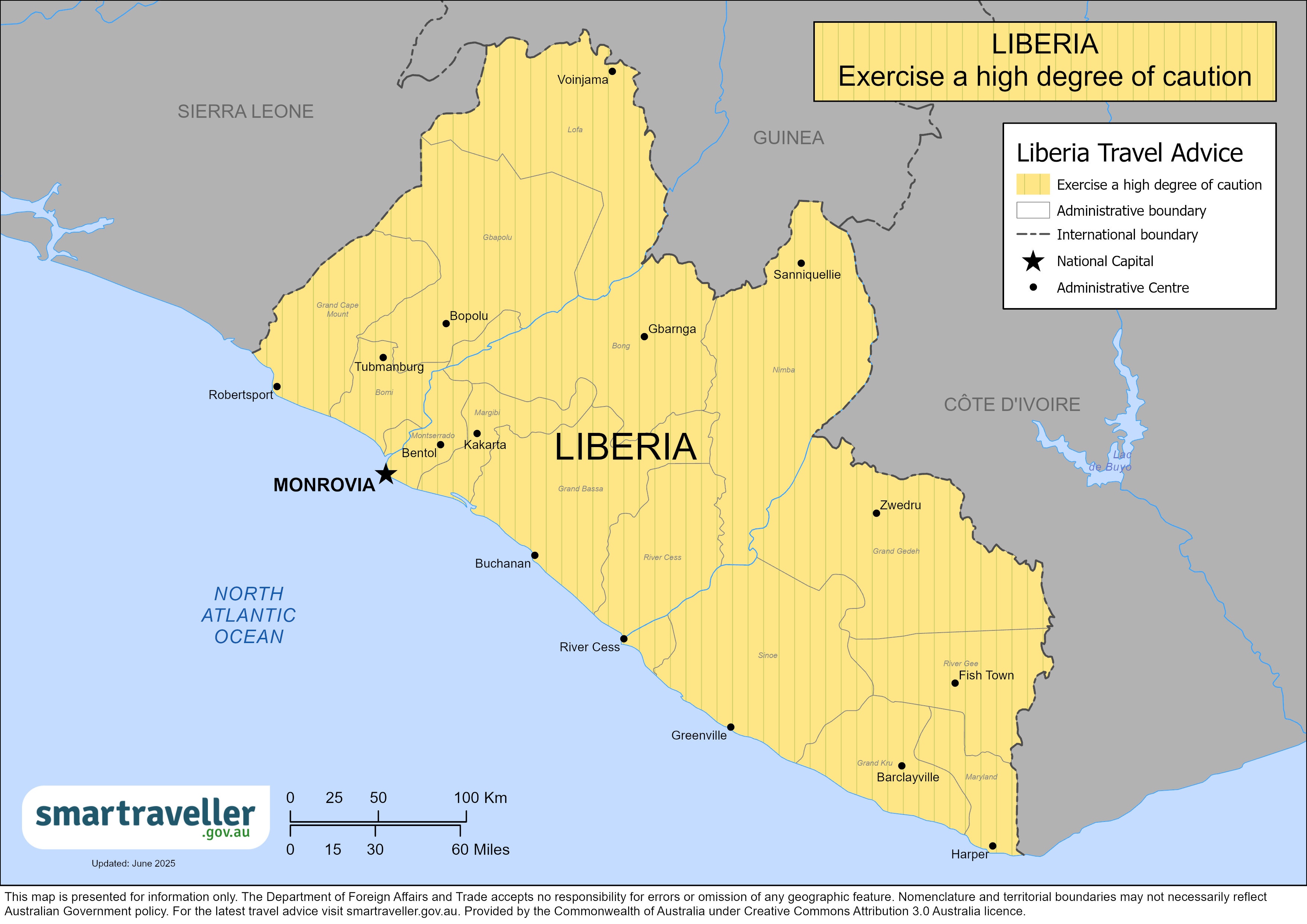The crime rate in Liberia is high. Most crime is opportunistic theft, including mugging, purse snatching and pickpocketing.
Violent crime may also be directed at foreigners, including in urban areas and on beaches. This includes home invasions, aggravated sexual assault and armed robbery. If you're a victim of violent crime, especially sexual assault or rape, get immediate medical attention.
There are organised criminal gangs in Liberia. Thieves are often armed with knives or machetes but occasionally also carry firearms.
To stay safe:
- be aware of your surroundings
- avoid carrying valuables or large sums of money in public and avoid obvious displays of wealth
- don't travel alone or after dark
Crime significantly increases at night due to the lack of electricity in many parts of the capital. Avoid areas where there are few people, such as beaches.
The Liberian National Police has very limited capability to prevent or detect crime or provide emergency response in any part of the country. Emergency services are not consistently available. Calls to emergency services may not be answered.
There is no landline telephone service in Liberia, and cellular phone communication may experience disruptions in service.
Consider your security arrangements carefully before you arrive in Liberia. Plan ahead and book only reputable accommodation with adequate guarding and security arrangements. Arrange for transport, including travel to and from the airport, in advance.
Corruption
Corruption occurs. 'Fees' are often requested by government officials and private company employees for doing their job. Requesting official signed receipts for the payment of any unexpected 'fines' or 'fees' can sometimes deter such improper behaviour.
Scams and fraud
Internet scams come in many forms. They may start as romance, friendship, business or job opportunities.
These scams often originate in West African countries, including Liberia.
If you travel to Liberia as a scam victim, you're at risk of:
Common fraud schemes fall into two main categories - commercial and relationship scams.
In commercial scams, criminals ask for details of safe bank accounts to transfer large amounts of money. They may:
- promise you a percentage of this amount to you
- send fake cashier cheques for urgent goods shipments
- ask for large fees for a fake government contract
- extort money from you for a fake business opportunity
In relationship scams, criminals often meet their victims through internet dating sites or chat rooms. Once they have formed a connection, they may:
- ask you to send money so they can come to Australia
- as you to come to Africa to meet them
Once you transfer money, the relationship often ends.
To protect yourself from scams:
- be wary of online contact from people you don't know
- don't send money until you've thoroughly checked the details of the person you're sending money to
If you suspect a scam, get legal advice.
Don't travel to Liberia to get your money back or to get revenge. If you travel to Africa to meet the criminals, you could be in danger.
More information:
Drink spiking
Drink spiking can happen anywhere. Be alert, don’t leave your food or drinks alone. Watch when your drink is being mixed. If you feel unwell, tell your friends immediately and get to a safe place. Keep an eye on your friends - if they feel unwell, stay with them. Get medical help if needed.
Methanol poisoning
People have died or become very sick from poisoned drinks overseas. This includes Australians. Methanol is highly toxic. As little as one shot can be fatal. Methanol can be added or accidentally created during poor quality alcohol production. Only drink branded, sealed drinks. Get urgent medical help if you think you’ve been poisoned.
More information:
Kidnapping
Kidnapping can happen anywhere, anytime, including in destinations that are typically at lower risk.
The Australian Government’s longstanding policy is that it doesn’t make payments or concessions to kidnappers.
More information:
Cyber security
You could face cyber threats in any country, anyone is a target. Your devices and data can be stolen, especially when using public Wi-Fi, computers, or Bluetooth. Criminals can use stolen information to conduct scams or to resell your personal information.
The Australian Cyber Security Centre has advice on how to protect yourself online.
Social media can also be risky in places with social or political tensions or strict laws. People have been arrested for what they posted online. Check the laws of the destination you’re travelling to and think about what you post on social media. The Australian Government can’t get you out of trouble if you’re accused of breaking the law.
More information:



